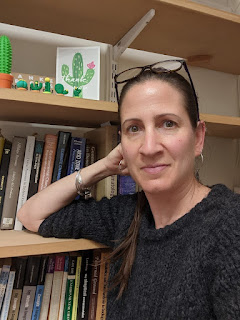 |
| Dr Katerina Michaelides |
In conversation with Dr Katerina Michaelides, co-theme lead at the Cabot Institute
Why did you choose to become a theme leader at Cabot Institute?
I was particularly attracted to this role because I am strongly committed to increasing the visibility of the great water-related work going on in the University, and because I feel strongly about developing the water research community within Bristol and further afield. Over the years since its creation, Cabot Institute has been instrumental in developing my connections with others within the University, in fostering new collaborations and in encouraging new and creative avenues of research. In that same spirit, I relished the opportunity to perform a similar role within the Cabot Water theme and give back to the community by helping to foster collaborations, contacts, and new avenues of research. I believe in the Cabot mission and ethos and felt that I can help strengthen the Water theme in this more formal role.
In your opinion, what is one of the biggest global challenges associated with your theme? (Feel free to name others if there is more than one)
One of the biggest impacts of climate change is on the water cycle. In fact, climate change can be thought of as synonymous with changes in the water cycle with far reaching implications for lives and livelihoods. Think catastrophic storms, droughts, floods, declining water quality. Water is such a fundamental part of life that many in the global north take for granted. So if I was to say one biggest challenge, I would say: addressing global water scarcity and food insecurity challenges under climate change and anthropogenic pressures. There are of course, many other challenges….
Across the portfolio of projects in your theme, what type of institutions are you working with? (For example, governments, NGO’s)
Our theme members work with a huge range of non-academic institutions – from insurance companies, charities, climate services providers, NGOs, local businesses among others.
What disciplines are currently represented within your theme?
We have a broad set of disciplines within the Water theme. These range from water and sanitation, climate impacts on water balance, flood risk and hazard modelling, flooding and infrastructure resilience, freshwater biogeochemistry (water quality), hydrometeorology, dryland hydrology, tropical hydrology, hydrological modelling, forecasting floods and droughts, water, and humanities. And much more!
In your opinion, why is it important to highlight interdisciplinary research both in general and here at Bristol?
Global challenges related to water and climate impacts are inherently multi- and interdisciplinary in their nature. It starts from understanding how climate is changing, to how these changes impact the water balance on the ground hydrology) and may lead to destructive floods or devastating droughts through their effect on agriculture and drinking water. Ultimately, because water intersects society on so many different levels (from natural disasters, to agriculture, to water resources, to droughts) research needs to be interdisciplinary and consider both environmental and social aspects of the problem.
Are there any projects which are currently underway in your theme which are interdisciplinary that you believe should be highlighted in this campaign?
There are lots of interdisciplinary projects across the Water theme. Personally, our research focusses on water scarcity, as highlighted by these two projects below:
Drought Resilience in East African dryland Regions (DRIER) – This is a collaboration between hydrologists, climatologists, social scientists, livelihoods experts, climate adaptation experts. Awarded a Royal Society Grant of £500K for 2020-2023, with Bristol leading and colleagues from Cardiff, UEA, University of Nairobi, and Addis Ababa University. DRIER has been selected as case study for the Royal Society Challenge-Led grant scheme and by BEIS for the GCRF.
Mobile App Development for Drought Adaptation in Drylands (MADDAD) – This interdisciplinary project between hydrologists and computer scientists, funded by a GCRF Translational Award (2019-2021) is developing a mobile phone app to deliver water status forecasts to remote communities in Kenyan drylands. Under climate change droughts are set to become more intense and frequent and there is a pressing need for relevant, timely, and practical information about water resources, particularly with a view to climate change adaptation. However, rural agro-pastoral populations are sparse and distant from decision-making centres making it hugely challenging to disseminate useable information in a timely manner. The provision of a mobile phone app has the potential to transform decision-making and drought adaptation for a large number of people in remote, rural dryland regions of East Africa that currently do not have access to useable and relevant information about the short- and long-term changes in water scarcity in their location.
Down2Earth – Translation of climate information into multilevel decision support for social adaptation, policy development, and resilience to water scarcity in the Horn of Africa Drylands. Awarded an EU H2020 Grant of €6.7M for 2020-2024, with Cardiff University as the lead Institution and ~€1M to University of Bristol. In total, 15 Institutions across UK, EU, East Africa, are involved, including many non-academic actors. This project is completely multi-disciplinary in nature.
For more information, visit Water.
